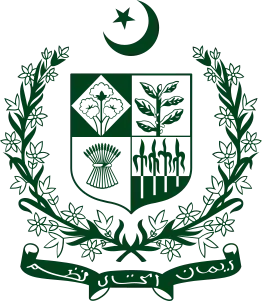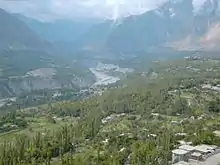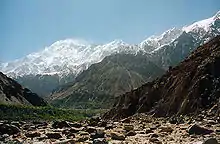Nagar (princely state)
Nagar (Urdu: ریاست نگر, Riyasat Nagar) was a princely salute state in the northern part of Gilgit–Baltistan(it was part of Jammu & kashmir state), Pakistan. Until August 1947, it was in a subsidiary alliance with British India. It bordered the states of the Gilgit Agency to the south and west, and the princely state of District Hunza to the north and east. From November 1947 to 1974 it was a princely state of Pakistan. The state capital was the town of Nagar.
| Nagar ریاست نگر | |
|---|---|
| Princely state of Pakistan | |
| 14th century–25 September 1974 | |
 Map of Pakistan with Nagar highlighted | |
| Capital | Nagar, Pakistan |
| Area | |
• | 5,000 km2 (1,900 sq mi) |
| History | |
• Established | 14th century |
• Disestablished | 25 September 1974 |
| Today part of | Gilgit-Baltistan, Pakistan |
 |
| This article is part of the series |
| Former administrative units of Pakistan |
|---|
The territory previously covered by Nagar forms three tehsils of the Nagar District of Northern Pakistan.
History
Nagar, founded in the fourteenth century, was an autonomous principality until the British gained control of the state following the Hunza–Nagar Campaign (1889-1893). It was a colonial princely state under the administration of the Gilgit Agency[1] until 1947, but from 1868 it was a vassal of the Maharaja of Jammu and Kashmir, despite never being directly ruled by Kashmir. The rulers of Nagar were considered to be among the most loyal vassals of the Maharajas of Jammu and Kashmir, sending annual tributes to their Durbars until 1947. The British granted them a Hereditary gun salute of 15-guns
In November 1947, Nagar acceded to Pakistan, which became responsible for its external affairs and defense, while Nagar maintained internal self-government. In 1968, Syed Yahya Shah, the first educated politician of the valley, demanded civil rights from the Mir of Nagar. In 1974, when Ayub Khan's dictatorship ended in Pakistan and the Pakistan People's Party (under Zulfiqar Ali Bhutto) was elected, the government forced the Mir of Nagar to abdicate. The area was then merged with the Northern Areas.[2]


Government
The state was governed by the hereditary rulers of the Maglot dynasty, who were styled as Mir. The details of these early rulers are uncertain; the first definite dates available are from 1839. In November 1947, the state became one of the princely states of Pakistan. Brigadier Mir Shaukat Ali Khan was the last ruler of the State before it was abolished by Pakistani PM Zulfiqar Ali Bhutto in 1972.
| Reign | Mirs of Nagar |
|---|---|
| c.1660 | Fadl Khan |
| c.1660 | Daud Khan |
| ~1750 | Ali Dad Khan (1st time) |
| Unknown dates | Hari Tham Khan |
| ~1761 | Ali Dad Khan (2nd time) |
| Unknown dates | Kamal Khan |
| c.1780 - 18.. | Rahim Khan I |
| 18.. - death 1839 | Rahim Khan II |
| 1839?45–1891 | Jafar Zahid Khan (first time) |
| 1891 - 1892 | regency: Raja Ozor Khan (died 1922) |
| 1892 - death 1904 | Jafar Zahid Khan (2nd time) |
| June 1905 - death 17 March 1940 | Raja Mir Iskandar Khan (from 1 Jan 1923, Sir Eskandar Khan) |
| 17 March 1940 – 25 September 1974 | Shukat Ali Khan (born 1909, died 2003 |
| 25 September 1974 | State of Nagar dissolved into Pakistan |
| After the dissolution of Nagar State in 1974 | Elected Representatives of Nagar in the Gilgit-Baltistan Legislative Council |
| 1975 | Syed Yahya Shah |
| 1980 | Mir Shaukat Ali Khan |
| 1985 | Qurban Ali |
| 1997 | (1) Mir Shaukat Ali Khan (2) Shiekh Ghulam Haider |
| 2000 | (1) Qurban Ali (2) Shiekh Ghulam Haider |
| 2005 | (1) Mirza Hussain (2) Muhammad Ali Akhtar |
| 2009 | (1) Mirza Hussain (2) Muhammad Ali Akhtar |
| 2015 | (1) Rizwan Ali (2) Muhammad Ali Haider |
| 2017 | Javed Hussain (by-elections in GBLA4 July 2017)[3] |
Population
Demographics
There are around 90,000 inhabitants of the Nagar valley (AKRSP Census, 2000).
Nagar is home to two main ethnic groups – the Burushaski speakers and the Shina speakers. An older type of Burushaski is still spoken in the valley with a mild modern accent. A third language, Bedeski, is also still spoken in Chalt Nagar.
Religion
The population is traditionally predominantly Shia Isna'asheri (Jafaria). Following sectarian violence in January 2005, the Tanzim Ahle Sunnah wal Jama’at representing Sunnis, and the Central Anjuman-e-Imamia Northern Areas representing Shias (Jafaria), signed a six-point peace agreement arranged by the Northern Areas Legislative Council (NALC) on 18 February 2005, to ensure peace in the area.[4]
Geography
The terrain of Nagar is extremely mountainous, which provided a certain degree of protection against invading forces. The highest mountain is the 7,788 m (25,551 ft) Mount Rakaposhi, south of the town of Nagar. The Karakoram Highway crosses Nagar, connecting Pakistan with China via the Khunjerab Pass. The road follows the Hunza river for some distance through Nagar and into the Hunza region. According to local languages Nagar Valley divided into two parts. Nagar Shinaki and Nagar Burosho.
Villages of Nagar
Shina Speaking Villages in Nagar (Shinaki/Sheenbar)
- Chalat (Paaeen/baala)
- Bar Valley
- Chaprote Valley
- Budalas valley
- Jafarabad Valley
- Nilt Valley
- Thol Valley
- Qasimabad Valley (Masoot)
- Ghulmet Valley
- Yal Valley
- Pissan Valley
- Minapin Valley
Burushaski Speaking Villages in Nagar
- Nagar Khas Valley
- Sikandar Abad
- Miachar Valley
- Dadimal Valley
- Phakker Valley
- Hakuchar Valley
- Shayar Valley
- Askurdas Valley
- Sumayar Valley
- Hoper Valley
- Nagar Khass (Nagar 1)
- Hisper Valley
Bilingual Valleys in Nagar
- Chalt Paeen Valley
- Akbarabad Valley
- Jafarabad Valley
- Qasimabad Valley (Masoot)
- Ghulmet Valley
- Pissan Valley
- Minapin Valley
The Nagar villages are mainly populated by religious scholars, Educationists, Sportsmen, Craftsmen and Craftswomen, farmers, hunters and fishermen, handicrafts, miners, Shepherds, adventurers, mountaineers ans so on.
References
- Chisholm, Hugh, ed. (1911). . Encyclopædia Britannica. 13 (11th ed.). Cambridge University Press. p. 957.
- Muhammad Ismail Tehseen, Buroshall Say Nagar Tak ka Safar, Syed Yahya Shah, Brushal ke Qabail, both in Urdu, available in Municipal library at Gilgit
- http://pamirtimes.net/2017/07/09/ppps-javed-hussain-claims-victory-in-nagar-by-elections/
- Ibrahim Shahid, Sunni and Shia groups sign peace deal in Gilgit Archived 4 March 2016 at the Wayback Machine, Daily Times (Pakistan), Sunday 20 February 2005
Further reading
- Mohammad Ismail Nashad, Buroshall say Nagar Tek Ka Safar
- Syed Mohammad Yahya Shah, Rasala Buroshall
- E. F. Knight, Zafar Hayat Paul, Where the Three Empires Meet